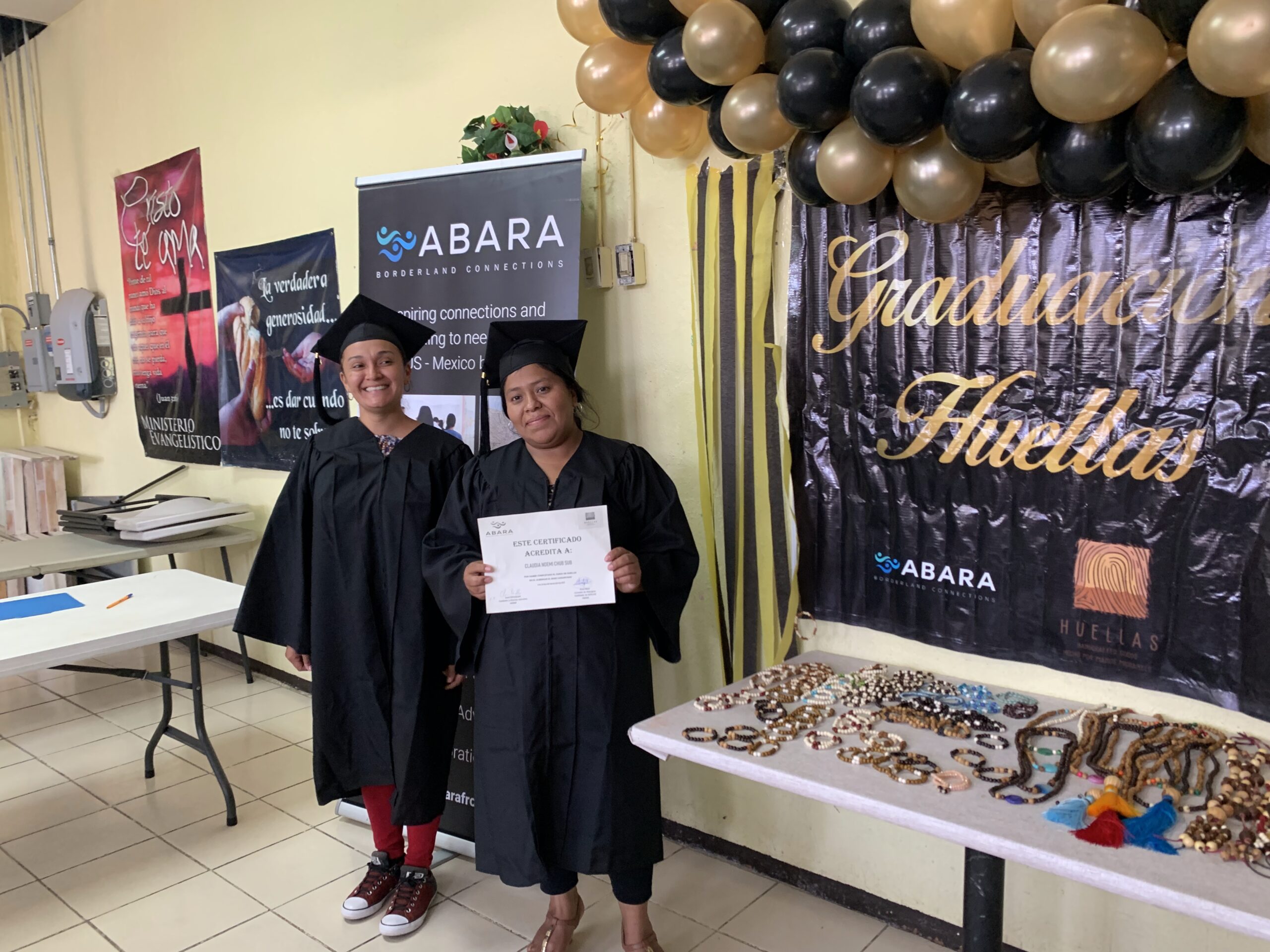Editor’s Note: I’d like to introduce myself: I’m Lyn, and I help write grants at Abara. Please let me share with you a recent border experience that both gladdened and pierced my heart. Thank you for reading Border Stories. The stories are unique to each person, each experience of journey, country, and heart.
The day is May 9th, 2024, and it’s graduation day for the Huellas program. Huellas (Spanish for fingerprint, or footprint) is Abara’s leadership and microenterprise workshop held in partnering shelters in Ciudad Juárez. Led by Rosa Mani, our Migrant Services Coordinator, Huellas aims to equip migrant women with important life-skills as well as opportunities to earn money through jewelry-making, wood working, sewing and the creation of other artisanal products, while they are waiting for a legal pathway into the US.
Now, many of the young people are helping prepare for the ceremony, blowing up black-and-gold colored balloons and hanging crepe paper next to a 4 x 4 ft poster tacked to the wall that pronounces, “Huellas” in gold cursive script.
It’s characteristically loud at the shelter because, as is the rule, children cannot go outside to play and instead use the main living room to scamper around with toys and shout at each other in their excitement. They are corrected to use “inside voices,” and things temporarily quiet down. Near a small table in the center of the room, two rows of chairs are arranged, ten in all.
Then the magic happens: Rosa opens a cardboard box that contains black graduation caps and gowns and begins handing them out. At first, the teenagers joke around, but soon the small group is properly dressed for the occasion. I breathe deep–the regalia is so impressive, juxtaposed with the surrounding chaos of the shelter…adults corralling their children, people washing dishes in the kitchen area, women chatting.
Rosa gathers a handful of would-be dignitaries who shake each graduate’s hand after they receive their diplomas. This particular Huellas group, she tells me, also has men because there weren’t enough women to comprise a full group. The shelter itself is for families only. The parents look so young to me, not more than 20 years old. It’s such a happy occasion and I am so honored to attend. But I can’t help wondering what the unknown next steps will be for these neat young kids.
I will let Rosa describe the ceremony and the Huellas program. She is much more eloquent than I, and this program is a large part of her already-burgeoned heart.
“I chose the name Huellas because in Spanish it means ‘footprints, fingerprints, or traces,’ she says. “It is part of the essence of people. We leave footprints behind as we go through life, with our steps, and we leave our fingerprints. We can also leave these prints on people’s lives and in their hearts.”
“They leave traces from the moment that they leave their homes; we want to leave traces of hope in their hearts. It is wonderful that the products they make in the workshops contain each participant’s essence, history, and emotions. In this life, we leave our prints everywhere, at all times: as we walk, we touch something. The type of prints we leave on people’s lives depends on how we have treated them. Sometimes we leave traces of sadness, but what a blessing it is to leaves traces of joy.”
Huellas has had graduation ceremonies since 2022. Aside from the cap and gowns, there is an impressive certificate. Later, everyone enjoys cake and ice cream.
“The graduations mean a lot. They are a way to dignify what their time on the border has meant. Families and individuals who are migrating expect to pass through extremely dangerous places, and suddenly they find themselves dressed in a cap and gown and receiving recognition for putting creativity into practice and learning dynamics and techniques that will give them tools in the future. We have had groups tell us that they had never graduated before, not even from Kindergarten. It gives people a different kind of story from their time on our border.”
She continues, talking with the new graduates. “All of you have left footprints on the road, since you left your homes, and we on this beautiful border have wanted to leave footprints in your story,” she says, “it is an honor that you you left your footprints on our lives.”
Her words stir my heart. While I will later return to my cozy life in El Paso, people here don’t know what tomorrow holds. A woman I sat with before the graduation was from Venezuela. She said that she had been living at the shelter for eight months, waiting for her CBP appointment. Eventually, I ask her what her experience was like in the deadly Darien Gap. They didn’t see any dead bodies, she tells me, they just smelled them.
Meanwhile, the ceremony has ended. The graduates remove their caps and gowns and hand them to Rosa, who puts them back in the box for the next graduation. The scene is so representative of people’s lives here, so changeable and eventful even in a few hours. The graduation has been a good way for them to spend some of their time. Any other way of saying goodbye never sufficed, Rosa explained.
“People didn’t want us to leave or finish the course, so we had to close in a great way—celebrate the wonderful time that we had—so what better than a graduation? It is a way to close our time together and make the experience of the program have a pleasant impact from start to finish.”
I ask her where she gets her seemingly never-ending energy and motivation. “I love what I do,” she says. “I feel my purpose on the border. Only God maintains our strength, and the motivation to continue only comes from His grace.”

